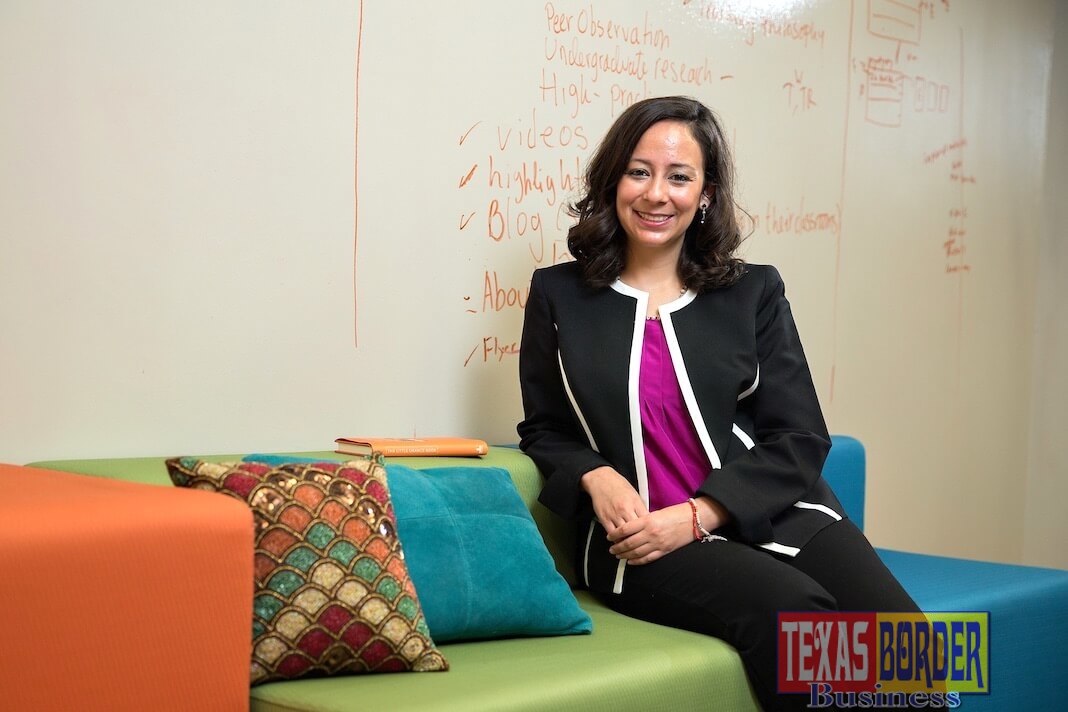
By J. Edward Moreno
Texas Border Business
RIO GRANDE VALLEY, TEXAS – AUG. 17, 2017 – Dr. Alyssa Guadalupe Cavazos, assistant professor of writing and language studies, was 10 years old when she migrated to the United States from a small town in rural Nuevo Leon, Mexico. She struggled through her early years in the American education system because of the language barrier, but it was that very challenge that helped her find her true passion – teaching.
Cavazos is one of four University of Texas Rio Grande Valley faculty members being honored this year with the 2017 Regents’ Outstanding Teaching Award by The University of Texas System. She is one of 56 faculty members across The UT System’s 14 academic and health institutions to receive the award, four of whom are from UTRGV.
“It’s thrilling,” Cavazos said, holding back tears. “It’s humbling to be recognized for doing what I love.”
Cavazos’s teaching philosophy stems from a series of personal experiences, specifically the time in seventh grade when her English teacher told her parents, “What do you expect? She’s failing English because it’s her second language. She’ll never earn an A.”
And that led her to ask herself, “Well, why not?”
So, she worked even harder to succeed in mastering English and not only earned that “A,” but ultimately found her passion for education. She went on to earn a bachelor’s and a master’s degree in English from UT Pan American and a Ph.D. in rhetoric and composition from Texas Christian University, before becoming a 12th-grade English teacher and, now, a university professor.
She encourages her students to embrace their differences.
“I want to teach in a way that all students can learn, and all students can succeed despite a language barrier or any other marker of difference,” Cavazos said. “I don’t want my students to feel like I am the expert in the classroom. I want them know that they are contributing knowledge, and we are learning together.”
Working at her alma mater gives her a unique sense of context that allows her to conduct her research more efficiently and connect more personally with her students, she said.
“I was a student here, so I feel like I can identify with many of them because I was once in their position,” Cavazos said.
Jacquelyn Ann Medina, a former student of Cavazos and a teacher at Donna North High School, said Cavazos’ class helped her in her professional career, and she uses it as a model for her own classroom.
“One of the major projects in her class was a portfolio, which was helpful to me when applying for my teaching position,” Medina said. “I try to model after Dr. Cavazos, and have often been praised because I was taught how to lead students into formulating ideas by asking probing questions.”
Cavazos’s influence extends beyond just her students. Dr. Mark Noe, associate professor of writing and language arts at UTRGV, said he attended one of her lectures and witnessed first-hand how she connects with her students and how it enhances the classroom environment.
“From the moment students stepped into class, I could tell they were relaxed and ready to learn,” Noe said. “She encouraged an open attitude by meeting the students where they were linguistically.”
Cavazos says her students’ linguistic diversity is exactly what inspires much of her research, which is centered on rhetoric in different settings among individuals of diverse linguistic backgrounds.
While working on her Ph.D., she focused specifically on communication between academics.
“For my research, it is critical for me to look into how bilingual academics, Latinos, Latinas, negotiate in different languages, in a field that tends to privilege English,” Cavazos said.
Recently, she has expanded her research to encompass academics in different fields, as well as students. She received the UTRGV Internal Seed Research Program Grant for the project “Biliterate/Multiliterate Writing Practices in Academic and Community Discourses,” which assesses the literacy practices of students and faculty.
“I want to know what the literacy practices are in the multi-literacies that students engage in inside of school, and outside of school in the community,” Cavazos said. “I want to find out how faculty facilitate those multi-literacies in the classroom in the way that they teach.”
Her research and pedagogy align with the university’s mission to promote bilingual education, which has benefited both her teaching and research projects, she said.
“I want students to know that our unique languages and writing experiences help us contribute knowledge in academia as we become advocates and agents of change in our communities,” she said.












